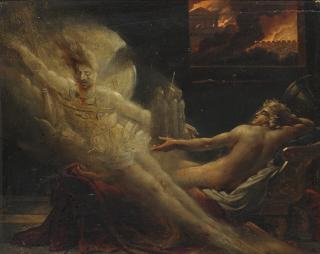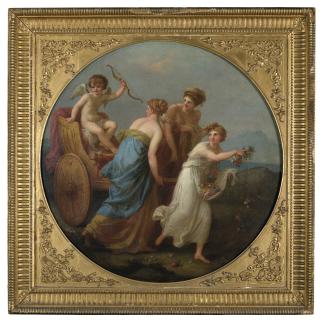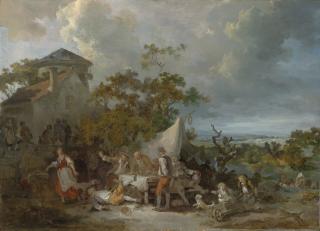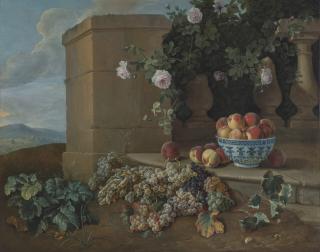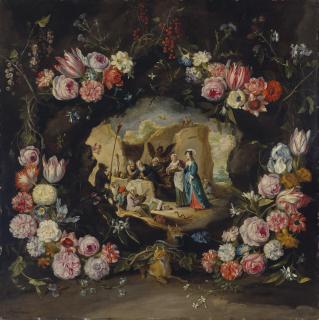Jean-François De Troy
Judith Tenant La Tête D’Holopherne
Found at
Christies,
New York
Maîtres Anciens : Peintures - Sculptures - Dessins, Lot 20
15. NOV - 15. NOV 2023
Maîtres Anciens : Peintures - Sculptures - Dessins, Lot 20
15. NOV - 15. NOV 2023
Estimate: 100.000 - 150.000 EUR
Price realised: 100.800 EUR
Price realised: 100.800 EUR
Description
JEAN-FRANÇOIS DE TROY, JUDITH HOLDING HOLOFERNES' HEAD, SIGNED AND DATED, OIL ON CANVAS
Previously, this imposing painting was only known to exist thanks to an advertisement of 1782, when it was for sale with M. Bossu, rue Saint-Denis, Paris, along with two other paintings by the painter. Its rediscovery adds a previously unseen subject to the work of Jean-François de Troy (1679-1752).
Taken from the Old Testament Book of Judith, the story of Judith and Holofernes recounts the fate of Holofernes, a Babylonian general who laid siege to the Jewish town of Bethulia because its inhabitants refused to support the war led by King Nebuchadnezzar II (627-265 BC). The town was on the verge of surrendering because the water supply was running out, but Judith, a ravishing young widow of considerable wealth, refused to give up. With her old maid, she entered the Babylonian camp one night. On seeing her, Holofernes immediately fell under the spell of her beauty and organised a feast in her honour, at the end of which he hoped to spend the night with her. However, when they were alone Judith to force him to drink, to the point where he was unable to defend himself; she then beheaded him and returned to Bethulia with his head. On discovering the death of their leader the next day, the Babylonian soldiers panicked and fled.
This story has inspired many artists over the centuries, and two key moments are the subject of almost all the paintings produced. The first is the beheading itself, with Judith's dramatic gesture as she plunges the sword into Holofernes' neck and the scarlet blood gushes from the fatal wound. Famous examples of this subject that can be cited are the painting by Caravaggio (1571-1610) in the Galleria Nazionale d'Arte Antica in Rome (inv. no. 2533) and the one by Artemisia Gentileschi (1593-1653) in the Uffizi (inv. no. 1890 n. 1567). The second moment in the story, and the one chosen by de Troy, corresponds to the moment when the triumphant Judith holds the head of the general in her hand. Less dramatic than the first, which requires tense muscles and a pool of blood, this moment is nonetheless the culmination of the drama and heralds her victory. In this instant Judith represents the triumph of the oppressed against tyranny, and in this case it is a singularly feminine triumph.
De Troy's treatment of the subject is in keeping with the French taste of the early 18th century. Here, Caravaggio's somber Baroque theatrics no longer have a place. This version is marked by the whimsical curves and asymmetrical lines of the Rococo style, with alternating fabrics and motifs, the stylised foliage on Judith's skirt and the stripes on that of her maid. Holofernes' mutilated body and head, with the sinuous lines of his muscles and hair, are camouflaged among the sheets. His blood is relegated to the very margins of the composition. This version of the triumph is notable for the absence of the brutality that is usually the epicentre of the painting. Instead, the artist presents us with a tender look, full of complicity between Judith and her old servant.
In de Troy's oeuvre we know of only two paintings that deal with the story of Judith and Holofernes, the present work and another that is still lost, whose existence is known to us thanks to the inventory of one Captain Filippo Palmieri written in Pisa in 1740. It is highly likely that the Palmieri painting dates from the artist's Pisan period, around 1704.
- Denisot chez M. Bossu, rue Saint-Denis, Paris, en août 1782 (selon Annonces, Affiches et Avis divers, ou Journal Général de France, 14 août 1782, op. cit. infra). | Collection particulière, Italie.
Previously, this imposing painting was only known to exist thanks to an advertisement of 1782, when it was for sale with M. Bossu, rue Saint-Denis, Paris, along with two other paintings by the painter. Its rediscovery adds a previously unseen subject to the work of Jean-François de Troy (1679-1752).
Taken from the Old Testament Book of Judith, the story of Judith and Holofernes recounts the fate of Holofernes, a Babylonian general who laid siege to the Jewish town of Bethulia because its inhabitants refused to support the war led by King Nebuchadnezzar II (627-265 BC). The town was on the verge of surrendering because the water supply was running out, but Judith, a ravishing young widow of considerable wealth, refused to give up. With her old maid, she entered the Babylonian camp one night. On seeing her, Holofernes immediately fell under the spell of her beauty and organised a feast in her honour, at the end of which he hoped to spend the night with her. However, when they were alone Judith to force him to drink, to the point where he was unable to defend himself; she then beheaded him and returned to Bethulia with his head. On discovering the death of their leader the next day, the Babylonian soldiers panicked and fled.
This story has inspired many artists over the centuries, and two key moments are the subject of almost all the paintings produced. The first is the beheading itself, with Judith's dramatic gesture as she plunges the sword into Holofernes' neck and the scarlet blood gushes from the fatal wound. Famous examples of this subject that can be cited are the painting by Caravaggio (1571-1610) in the Galleria Nazionale d'Arte Antica in Rome (inv. no. 2533) and the one by Artemisia Gentileschi (1593-1653) in the Uffizi (inv. no. 1890 n. 1567). The second moment in the story, and the one chosen by de Troy, corresponds to the moment when the triumphant Judith holds the head of the general in her hand. Less dramatic than the first, which requires tense muscles and a pool of blood, this moment is nonetheless the culmination of the drama and heralds her victory. In this instant Judith represents the triumph of the oppressed against tyranny, and in this case it is a singularly feminine triumph.
De Troy's treatment of the subject is in keeping with the French taste of the early 18th century. Here, Caravaggio's somber Baroque theatrics no longer have a place. This version is marked by the whimsical curves and asymmetrical lines of the Rococo style, with alternating fabrics and motifs, the stylised foliage on Judith's skirt and the stripes on that of her maid. Holofernes' mutilated body and head, with the sinuous lines of his muscles and hair, are camouflaged among the sheets. His blood is relegated to the very margins of the composition. This version of the triumph is notable for the absence of the brutality that is usually the epicentre of the painting. Instead, the artist presents us with a tender look, full of complicity between Judith and her old servant.
In de Troy's oeuvre we know of only two paintings that deal with the story of Judith and Holofernes, the present work and another that is still lost, whose existence is known to us thanks to the inventory of one Captain Filippo Palmieri written in Pisa in 1740. It is highly likely that the Palmieri painting dates from the artist's Pisan period, around 1704.
- Denisot chez M. Bossu, rue Saint-Denis, Paris, en août 1782 (selon Annonces, Affiches et Avis divers, ou Journal Général de France, 14 août 1782, op. cit. infra). | Collection particulière, Italie.
Auction result well in line with expectations
The work Judith Tenant La Tête D’Holopherne by Jean-François de Troy was sold in the Maîtres Anciens : Peintures - Sculptures - Dessins auction at Christies in New York in November this year. The estimated price for the artwork was previously given by the auction house with a range of EUR 100,000.00 – 150,000.00, the actual price achieved of EUR 100,800.00 could thus just exceed the lower estimate. Of course, this price has nothing to do with the top prices that other works by Jean-François de Troy achieve. The highest price we have observed so far was reached by the work The Reading Party in December last year with an auction result of GBP 2,922,000.00 (€ 3,298,653.39).
Auktionsergebnis im Rahmen der Erwartungen
Die Arbeit Judith Tenant La Tête D’Holopherne von Jean-François de Troy wurde im November diesen Jahres in der Auktion Maîtres Anciens : Peintures - Sculptures - Dessins bei Christies in New York versteigert. Der Schätzpreis für das Kunstwerk wurde von dem Auktionshaus zuvor mit einer Spanne von EUR 100.000,00 – 150.000,00 angegeben, der tatsächlich erzielte Preis von EUR 100.800,00 konnte den unteren Schätzpreis somit knapp übertreffen. Dieser Preis hat freilich nichts mit den Spitzenpreisen zu tun, die andere Arbeiten von Jean-François de Troy erzielen. Den höchsten von uns bisher beobachteten Preis erreichte die Arbeit The Reading Party im Dezember letzten Jahres mit einem Auktionsergebnis von GBP 2.922.000,00 (€ 3.298.653,39).


















